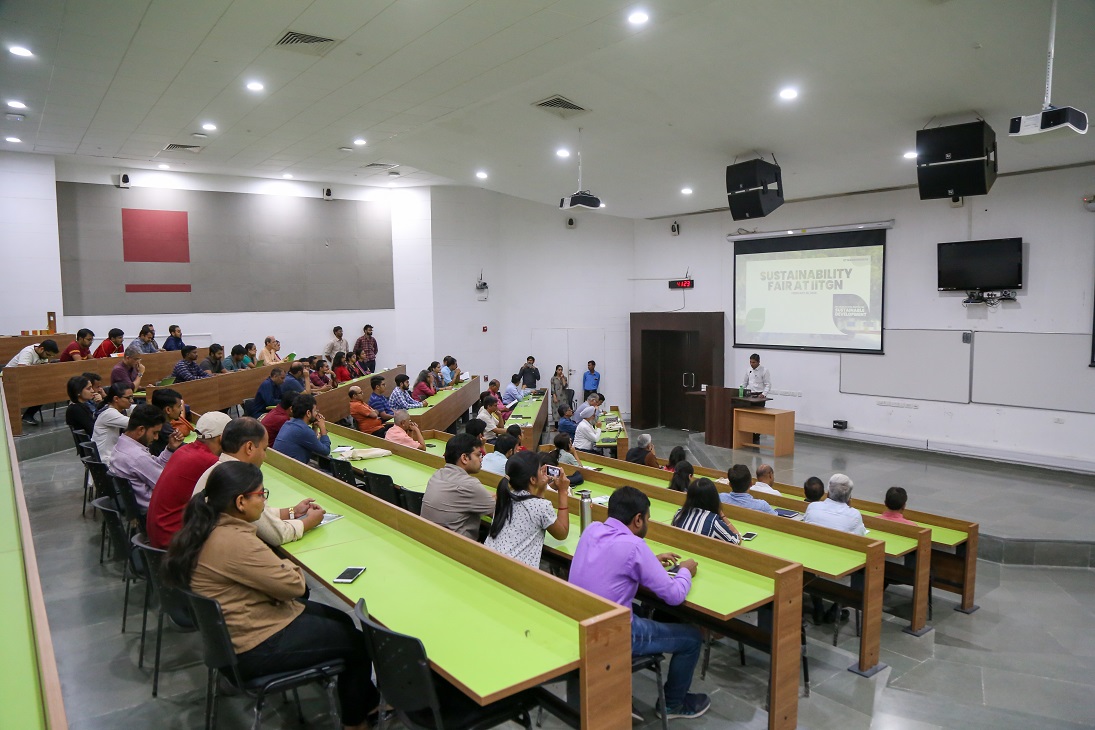“We as citizens and as educators need to do our part for the sustainable development, because it will not happen without it.”- Mr Kartikeya Sarabhai
“Sustainable development is not a word, not a picture, not a logo; it’s a new way of thinking.” – Mr Sarbjit Singh Sahota, UNICEF
Gandhinagar: The Dr Kiran Patel Centre for Sustainable Development at the Indian Institute of Technology Gandhinagar (IITGN) hosted its second annual Sustainability Fair today on February 28, 2020. The event was inaugurated with addresses by three keynote speakers of the program Mr Kartikeya Sarabhai, Founder & Director, Centre for Environment Education; Dr Ratan Chand Jain, Ex-Chairman, Central Groundwater Board; and Mr Sarbjit Singh Sahota, Emergency Specialist, Disaster Risk Reduction Section, UNICEF India.

The first keynote speaker at the inaugural session Mr Kartikeya Sarabhai talked about sustainable development and the challenge of ever-increasing population. He said that studies have shown that education contributes to reaching the goal of sustainable population. Highlighting the culture of unsustainable living and its adverse impact, Mr Kartikeya Sarabhai said, “The way humans’ habits of consumption, waste generation, and use of water are changing to be more and more unsustainable. Today we need a planet and a half to survive and if we continue this way, in future we will need two and a half planet, while the goal is of the single planet. Every year we are exhausting nature’s resources faster than previous years. India has the ethos of saving, but we have to think to turn some of the good old habits into a new context of sharing.” He gave examples of selling old stuff online to increase shelf-life of a product and adapting to car-pooling instead increasing more vehicles on already overcrowded roads.
Talking about the drivers of change for sustainable development and the importance of adopting the model of Hand Print for action towards sustainability, Mr Sarabhai said, “Daring to think differently and sustainably than the rest of the world is what we need. Instead of only focusing on the carbon footprint, we should also focus on Hand Print, which symbolises positive energy and indicates the action we take as an individual, as a community and as a nation for sustainable development. When the government is taking many initiatives, we as citizens and educators need to do our part, do more to increase our hand print and decrease the footprint.”

The second keynote speaker Dr Ratan Chand Jain talked about nature based solutions for water security and resilience in the face of climate change in India. Dr Ratan said, “With the increasing demand of water for various purposes and reduced groundwater recharge against the rate of its withdrawal, sustainability of groundwater is going to be a big challenge for the country as a whole.”
He elaborated on various nature based solutions for water security and resilience and said, “Nature-based solutions for water have contributed greatly to the dialogue on environment management to meet human needs sustainably. The approaches for better management of natural resources include enhancing recharge of aquifers through rainwater harvesting, mandating water harvesting and artificial recharge in urban areas, ground water governance, incentivising to promote recharging of groundwater, intelligent power rationing for irrigation, optimising water use efficiently, and conjunctive management of surface water, groundwater and rainwater.”

The final keynote speaker Mr Sarbjit Singh Sahota stressed upon dissolving problems instead of solving them through the principles and pathways for sustainability. He said, “Socio-economic complexity with unsustainable ecological footprint has brought shocks and stresses such as pollution, human-driven climate change, and less reliable food and water supplies due to extreme events such as droughts or floods. We need to listen to those whose lives are impacted by climate change and unsustainable practices of development.”
He presented a case study of women farmers of Marathwada who collectively piloted a new era of sustainable farming practices and thereby ensured water, food, nutrition, and livelihood security to guarantee community resilience. “When you involve women in any decision, things transform. More gender-responsive programming in any sector would transform the resource base.” He underlined the need to use systems thinking that sets it apart from other paradigms and said, “Mechanical problem solving is the past as it fails when social systems are involved. We have to think of more social ways of solving problems. Solving a problem doesn’t necessarily lead to the ideal situation. After a while, we get back to the problem. So we should focus on creating the ideal and desirable behaviour. Sustainable development is not a word, not a picture, not a logo; it’s a new way of thinking.”
The Sustainability Fair is aimed at fostering collaborations between IITGN faculty and organisations and industries in the area of sustainable development. The idea is to generate a platform where government bodies, NGOs, and other organisations working in the area of sustainable development can mutually share ideas and practices on water, pollution & waste management, energy, climate change, wildlife & ecosystems. Almost 30 exhibitors, including government agencies, NGOs, welfare organisations, and industry leaders participated in the current edition of Sustainability Fair and showcased a wide range of sustainable development practices, projects, products and services.
Some of the prominent exhibitors included Climate Change Department, Government of Gujarat; Centre for Environment Education; Foundation for Ecological Security; GEER Foundation; Geological Survey of India; Arvind Envisol Ltd; Gujarat Biotechnology Research Centre; International Water Association; Masibus Automation and Instrumentation Pvt Ltd; Savy Electric Vehicles Private Limited; Sundarvan Nature Discovery Centre; UNICEF; Wildlife Trust of India; among others. Vhali, the life-sized model of the whale shark, was also on display at the exhibition by the Wildlife Trust of India to spread awareness about the whale shark and its conservation.
The Sustainability Fair concluded with a networking session to explore knowledge sharing and academia-Industry partnerships around a wide range of sustainable development themes. Students, faculty, research scholars, representatives of government, advocacy agencies and industries attended the event.
About the Centre:The Dr Kiran C Patel Centre for Sustainable Development at IIT Gandhinagar undertakes cutting-edge research on sustainability and related challenges of high societal importance and promotes cost-effective and sustainable solutions through its strong outreach and technology-transfer programmes.
Press Communique: IIT Gandhinagar




